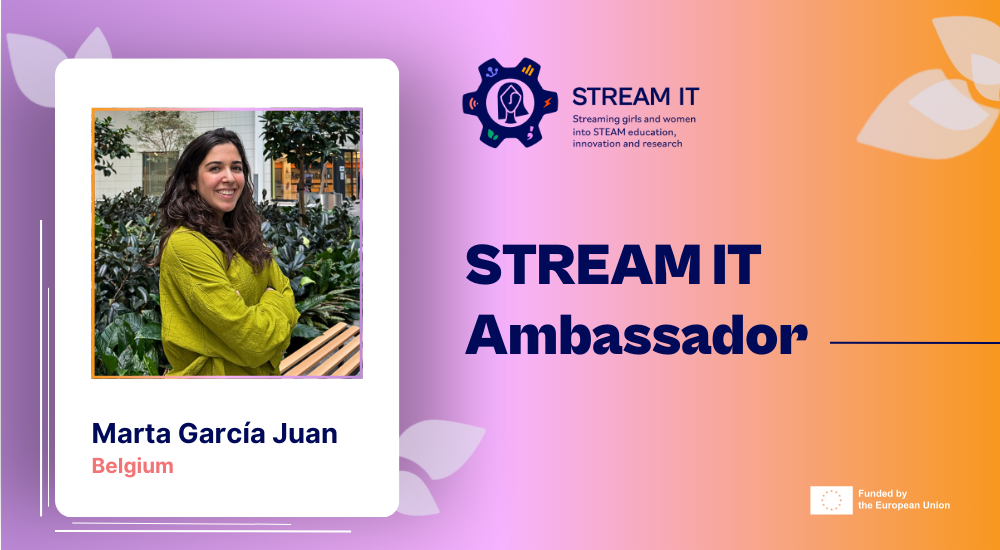
Name: Marta García Juan
Country: Belgium
Highest level of education: PHD
Major or field of study: Biomedicine
Current position: Scientific Officer
Marta García Juan, holds a PhD in Molecular biosciences with a focus on Neuropathology. Her research tries to understand the biology of brain cells during the progression of neurodegenerative diseases, such as Alzheimer’s disease. Based in Brussels, currently she applies her expertise in her field to help in the evaluation of scientific proposals by top researchers in Europe.
Marta’s Challenges and Overcoming Them
Obstacles Marta encountered throughout her educational and professional journey
Like many women in STEM, Marta has navigated several obstacles. One significant challenge was the lack of visible female role models during her formative years, which made it difficult for her to envision a future for herself in science. This early lack of representation contributed to imposter syndrome as she progressed in her career, leading to a persistent feeling of needing to prove her worth. In the demanding field of neuroscience, this pressure could have resulted in burnout, but Marta has actively worked on strategies to achieve a healthy work-life balance and cultivate self-assurance in her skills.
Strategies and actions adopted by Marta to overcome these obstacles
To overcome these obstacles, mentorship played a crucial role during Marta’s degree and early lab experiences. She actively sought out researchers and professionals who could provide guidance and support. Marta believes that setting clear goals and cultivating a strong support system are fundamental in any field. Furthermore, Marta took proactive steps such as applying for fellowships abroad, which enabled her to fund a research stay and gain valuable international experience. During her PhD, participating in international congresses, workshops, and outreach events significantly boosted her confidence and improved her public speaking abilities. Now, as a scientific officer, Marta leverages these experiences to engage in science communication projects that increase the visibility of research.
Key lessons and insights gained from Marta’s experience
Drawing from her experience, Marta has learned that resilience and persistence matter more than striving for unattainable perfection. Networking and actively seeking mentors have proven essential to help her grow. Furthermore, she realises that incorporating diverse perspectives in science significantly enhances the quality of research and fosters greater innovation. This understanding has cultivated a passion in Marta for fostering an inclusive and supportive environment for future generations of scientists.
Marta’s Opinion on the Importance of Women in STEM
The importance of increasing female representation in STEM education and careers
In Marta’s opinion, increasing the representation of women and girls in STEM education and careers is crucial for several key reasons. Firstly, a greater diversity of perspectives leads to more creative and innovative solutions, which is especially vital in the ever-evolving fields of science and technology. Given that women and gender minorities remain significantly underrepresented, their increased participation is essential. Secondly, as half of the world’s population, women deserve an equal role in shaping the future of science and technology. Greater female representation can also inspire more girls to pursue STEM, fostering more inclusive and ultimately more accurate scientific discoveries.
Encouraging more girls and women to pursue careers in STEM
Marta thinks that fostering greater female participation in STEM requires both inspiration and systemic change. Showcasing the accomplishments of women in STEM provides vital inspiration for young girls, offering tangible examples of what’s possible. We need to amplify the visibility of female role models across society to challenge limiting narratives and stereotypes from an early age. Simultaneously, creating truly inclusive and supportive workplaces through robust gender policies and attention to work-life balance is necessary to ensure women can thrive in these careers.
Initiatives and Programs Driving Women’s Empowerment in STEM
Numerous initiatives and programs are making significant positive impacts on women’s involvement in STEM. One notable example is WOMEN IN AUTOPHAGY (WIA), an international network dedicated to empowering women and under-represented gender identities in the autophagy field, as evidenced by their features in Nature publications. On a national level, Spain’s Iniciativa 11 de Febrero stands out as a citizen-led movement that organises widespread activities for the International Day of Women and Girls in Science, powered by dedicated STEM volunteers. Within specific scientific disciplines, groups like ASEICA WOMEN in Spain are crucial, as they actively work to highlight and support female cancer researchers. To address leadership in innovation and technology, the European Innovation Council and the European Institute of Innovation and Technology have partnered on the EIC Women Leadership Programme. Moreover, systemic issues like bias are being tackled by the ERC Working group on gender and diversity through initiatives such as implicit bias training in scientific evaluations. Finally, various science outreach events, including the European Researchers’ Night, Pint of Science, and Solo de Ciencia, contribute significantly by showcasing the diverse women contributing to research across different fields.

Marta’s advice to young girls considering a career in STEM
“Diversity in STEM leads to better discoveries. Remember that your ideas and contributions matter! I advise you to be curious, ask questions and explore what excites you most, and you will find mentors and role models that can inspire you and offer guidance. Believe in yourself – you belong in STEM as much as anyone else.”
